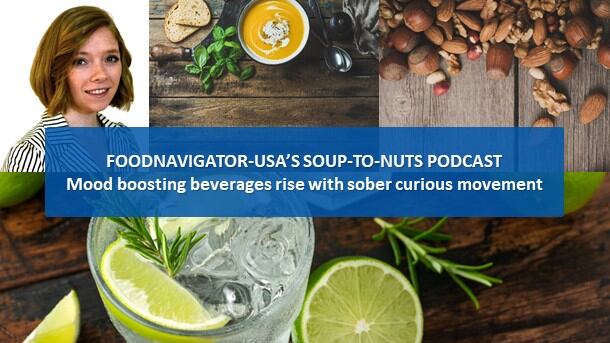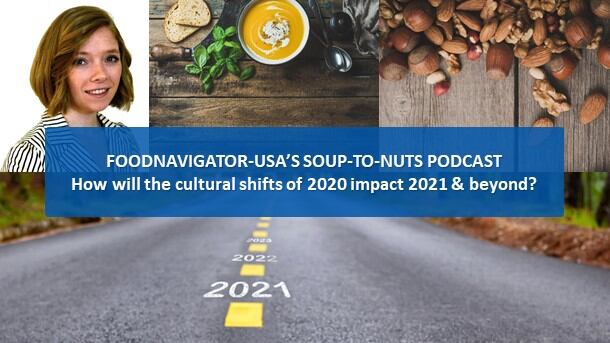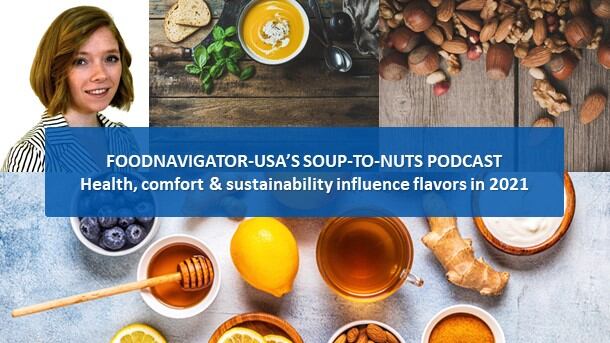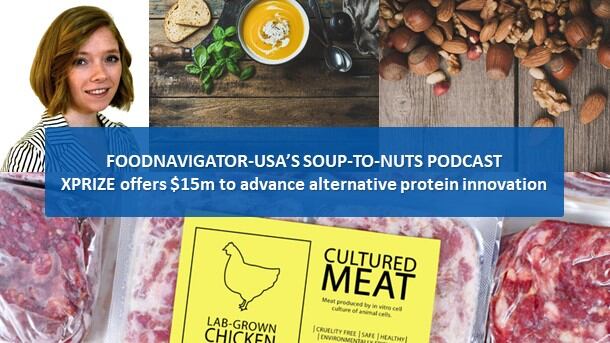At least temporarily.
According to research from the alcohol alternative beverage brand DRY Botanical Bubbly, 33% of the Americans plan partake this year in a traditional or modified ‘dry January,’ a month in which participants hit a hard reset on the indulgences that typically come with the holiday season by giving up or drastically cutting back on alcohol consumption.
The idea of a dry January isn’t new, and has been gaining traction in recent years, but those pledging participation in 2021 is up significantly from the one in seven who participated in 2020, according to You Gov data. This uptick is notable after a year in which alcohol consumption increased dramatically, with Nielsen noting alcohol sales in the US skyrocketed 54% in mid-March 2020 compared to 2019 and research published in JAMA found the frequency with which study participants drank alcohol increased 14% between 2019 and mid-June 2020.
In this episode of FoodNavigator-USA’s Soup-To-Nuts podcast we take a closer look at what is driving the ‘sober curious’ movement and its market potential. Holly McHugh, a marketing associate with the beverage development firm Imbibe, shares which benefits and ingredients resonate with consumers as well as how to overcome formulating and regulatory challenges when incorporating functional ingredients in beverages. We also hear from PepsiCo and SipClean about how industry players large and small are meeting evolving consumer demands for functional beverages and non-alcoholic wine, beer and spirits.
[Editor’s note: Never miss another episode of FoodNavigator-USA’s Soup-To-Nuts podcast – subscribe today.]
A ‘profound’ need for relaxation
One of the reasons that many Americans embraced alcohol last year and during the pandemic is the same reason they are now embracing functional beverages and that is a deep need for stress relief.
According to McHugh, the majority of people are concerned about their health – including their mental well-being, and as such are seeking beverages that can help them relax, unwind and sleep without the negative side effects of alcohol.
“Consumers are looking for relief. I saw a survey by the Hartman Group that 58% of consumers are concerned about their mental health … and since the onset of the pandemic I think that has become an even bigger issue,” she explained. “I think that mood boosting beverages that address those needs will be one of the next big functional beverages for that reason.”
While the idea of mood boosting beverages is still fairly new, McHugh notes several ingredients are gaining popularity for their calming effects, including CBD, adaptogens, l-theanine and some micronutrients like magnesium.
PepsiCo dips toe in mood-boosting beverage sector with Driftwell
These last two – L-theanine and magnesium – are the key ingredients in PepsiCo’s recently launched, but already award-winning, end-of-day beverage Driftwell.
“Driftwell is an enhanced still water beverage, and it’s really designed with relaxation in mind. It contains ingredients like L-theanine, which hep promote relaxation, as well as magnesium, blackberry lavender flavor to really give you that soothing moment, and it comes in this really nice 7.5 ounce can” with zero calories and zero sugar, explained the brand’s senior manager Ryan Buesser.
He explained that there is a “real need for relaxation in the market,” and it is fueling interest in the enhanced water market, which is estimated to grow to $11.3b by 2027.
PepsiCo chose L-theanine because it is well-researched and studies support functional claims that meet consumer needs. The ingredient also is attractive because it comes from sources familiar to consumers, such as tea leaves, Buesser added. Finally, he noted, the beverage includes a 200 mg dose, which studies show help promote relaxation.
“We don’t want to make claims or move into a functional market without a product that can really substantiate that,” he added.
Give the beverage, and concept behind it, are still new to PepsiCo, the CPG is taking a go-to-market strategy that follows consumers. By selling it online first, Buesser said that PepsiCo can see where in the country there is the most interest and get a better idea of who the buyer is before launching in brick and mortar stores.
Regulatory, formulating challenges must be addressed
The rigor that PepsiCo brought to formulating Driftwell is key to the long-term success of the overall mood-boosting beverage space, but McHugh warns it isn’t easy. She notes that many of the functional ingredients gaining prominence in this space come with regulatory challenges that must be addressed.
“One of the concerns when you’re thinking ‘is my product going to be a supplement or is it going to be a food or a beverage,’ is the GRAS status of the ingredient and whether or not they are generally recognized as safe by the FDA. And a lot of these ingredients haven’t been verified by the FDA,” McHugh notes.
She also warns against making overt claims that an ingredient or product can cure or mitigate a disease state because that would push a product into the drug territory.
McHugh also notes many functional ingredients also come with formulating challenges, including off-notes, suspension issues, high costs and under-developed supply chains.
“We’ve been formulating a lot more with adaptogens and one of the big issues with adaptogens is that they can taste pretty funky on their own,” and therefore require masking, which Imbibe helps manage, McHugh said.
Sedimentation can also be an issue and, therefore, these beverages may require a stabilizer system, “which isn’t always attractive to consumers,” but if the value is clearly communicated to them they may be willing to trade off on “clean label” aspects, she said.
SpinClean doesn’t compromise, and doesn’t expect consumers too either
The creators of the dealcoholized wine SipClean and its CBD-enhanced sister brand SipCozy didn’t want consumers to compromise on a clean label in exchange for a relaxing, flavorful alcohol-free experience, which is why SipClean’s founder Alex Klempf and winemaker Meredith Leahy explain they created their recently launched nonalcoholic rose wine with high quality, natural ingredients and a state-of-the-art spinning cone technology that removes the alcohol while preserving the natural flavors and bright aromas of the original grapes.
“SipClean is a non-alcoholic rose wine for adults over the age of 21, and Meredith and I really felt like creating an alternative to alcohol with a wellness focus. So, we wanted to keep the product as simple as possible,” Klempf said.
She added that there are different moments in consumers lives when alcohol isn’t the right choice for them, but that doesn’t mean they should have to choose between their values or an overly sweet, tasteless or artificially flavored beverage.
With that in mind, she said, SipClean’s process is what sets it apart from the competition and other non-alcoholic wines, mocktails and juices.
Leahy explains that the spinning cone technology used by SipClean is head and shoulders better than other processing options when it comes to preserving the flavor, aroma and wine but without the alcohol.
“We’ve found a great base wine, which was made the same way wine is made. So, grapes come in, with rosés it’s whole cluster pressing, and then you add yeast and you ferment it. … This was fermented in a little bit of neutral oak and some stainless steel, and then once the wine is finished fermentation, this is when the de-alcoholization process starts,” she explained.
“We’ve partnered with a company that uses what is called spinning cone technology, and this technology … is the highest quality out there in preserving the characteristics of the base wine. It handles it more delicately and preserves the aromatics and the flavor more than some of the other processes,” which means SipClean doesn’t need artificial flavors added at the end, she further explained.
The duo opted to create a dealcoholized rose instead of a red or lighter white wine in part because it is technically more challenging to create a good-tasting non-alcoholic red wine without additives or flavors, and because rose is “approachable,” and she hopes that someday SipClean will be as ubiquitous as house wines that are served at events, restaurants and readily available at dinner in homes.
Price and calories remain a hurdle
While the consumer appetite may be there for non-alcoholic wine, beer, spirits and functional beverages, McHugh says the category must first overcome two major challenges to widespread consumer adoption: price and calories.
Recognizing that many consumers are turning away from alcohol or seeking alternatives for health reasons, both SipClean and Driftwell keep the calorie counts low at 30 and zero per serving respectively.
As for price point, SipClean stresses its product is fairly priced at four cans for $16, but some consumer education likely is necessary to fully communicate the value. PepsiCo’s Driftwell comes in at a similar price point of about $3 per 7.5 ounce serving via Amazon, and Buesser agreed that consumer education will be key as will be trial.
Ultimately, as consumer awareness of and comfort with non-alcoholic and mood boosting beverages grows, McHugh says so too will the market potential. She also predicts that the end of the pandemic will have an outsized impact on the space as consumers look for ways to “undo the damage” caused from months of indulging in alcohol and comfort foods at home.




